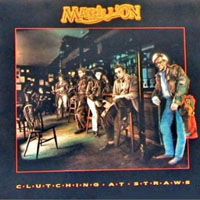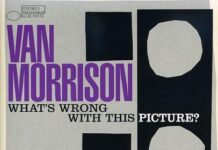In those dim, dark days of the early 80s, in the face of the Haircut 100’s and MTV, when it seemed all our heroes were rendered mute or producing albums that weren’t getting airplay — really what were we guys and girls who were into Emerson, Lake & Palmer, Pink Floyd and Jethro Tull going to do when our favorite bands had either broken up or floundered away their relevance? We found Marillion.
Founded in 1979, this neo-progressive band (whatever that label means) released four albums in their first incarnation when their lyricist and frontman Fish was still in the band. The band was enjoying great popularity with their 1985 concept album Misplaced Childhood, featuring the hit “Kayleigh.” Their next record, 1987’s Clutching At Straws, was their last record with Fish. It may also be their finest work and certainly a lost gem if there ever was one.
Reaching the second highest place on the charts for a Marillion album, Clutching at Straws is dark with a loose theme, yet still pretty much a concept album. It starts with “Hotel Hobbies” with Mark Kelly’s keyboards faking a xylophone opening after some low weirdness and Peter Trewavas’ bass noodling. Fish sings about the character of Torch — more or less, the “Jester” character from previous Marillion albums…or so the liner notes on the bonus CD of the reissue tell us. This first song is driven by a good groove with perfectly placed Steve Rothery vibrato guitar trills.
“Warm Wet Circles,” the second song in, and we get a good clear indication of the shades of this band’s music, as Rothery shines and Fish increases his A-game lyrically. This is also the first mention of “warm wet circles” to play a prominent part in the whole story later on. By the six-minute song’s end, things are getting quite dramatic indeed. Keyboardist Mark Kelly’s piano playing adds such sweet colors just before the band eases into “That Time Of The Night (The Short Straw)” where Fish flexes his highest tone and the band lays down a stunted groove. There is a recurring musical theme introduced, along with the backing vocals of Tessa Niles, and Fish starts shouting in the heavy melee of the band behind him by the song’s end.
“Going Under” is a nice spacey interlude, acting as a catalyst as the band lays down some great atmospheric backing – something Marillion learned well from the progressive bands before them. “Just For The Record,” one of the more commercial moments, featuring Ian Mosley’s truly inspired hoping drumming and a reverse of the usual formula where the chorus here is more lilting and soft then the verses which sees Rothery’s controlled wailing and some of Fish’s best sardonic lyric. The bridge is a sing-able-not usual for a Marillion tune and we also get the first of Kelly’s leading playing.
We’re more or less back to the main theme of the album with “White Russian” a truly inspired tune, full of some real good imagery in the lyric, Mosley and Trewavas trading some great drumming and bass, Rothery truly coming alive in single note perfection during the “racing the clouds home” ending…and the use of the word ‘cenotaph’ in a rock lyric! This really is the centerpiece of these 12 songs. The band makes another attempt at a single with the upbeat “Incommunicado.” About as perfect a single as any progressive rock band could ever hope to have, there’s a fun, sardonic lyric, blistering riffs and leads, and straight ahead drumming. In a fair world, this should have been the follow-up hit to “Kayleigh.”
Things slow down, then get back on track on “Torch Song,” relating of our lead character’s plight. This is another softer atmospheric stab, complete with laughter and drinking sounds in the background, just behind Trewavas’ bass harmonics. Fish might be in his best voice on this one, complete with some spoken word sections and a little coughing. There are more thoughts on drinking in “Slainte Mhath,” an Ian Mosley-led tune with Rothery’s echoing riffery and indelible lead playing.
“Sugar Mice” is a beautiful and mature look at a man suffering the fate of being on the road and away from his kids. This song has everything — Trewavas’ talking bass parts, Rothery’s feathery light arpeggios, the highs, lows, sadness and anger in Fish’s voice, Kelly’s perfect use of key strings and Mosley rolling in just when he’s needed. Marillion certainly had these fantastically poignant moments with Fish, but “Sugar Mice” may be one of their best.
“The Last Straw” is actually the last actual song here (“Happy Ending” features only Fish laughing). Fish is biting his lyrics now and the band is playing hard, concluding a pivotal era in progressive rock. Marillion has gone on without Fish, releasing music for a rabid fan base and remaining one of the more popular of progressive bands from the 80s. Even so, Clutching At Straws might just be the band’s — and Fish’s — high watermark.
~ Ralph Greco, Jr.




















